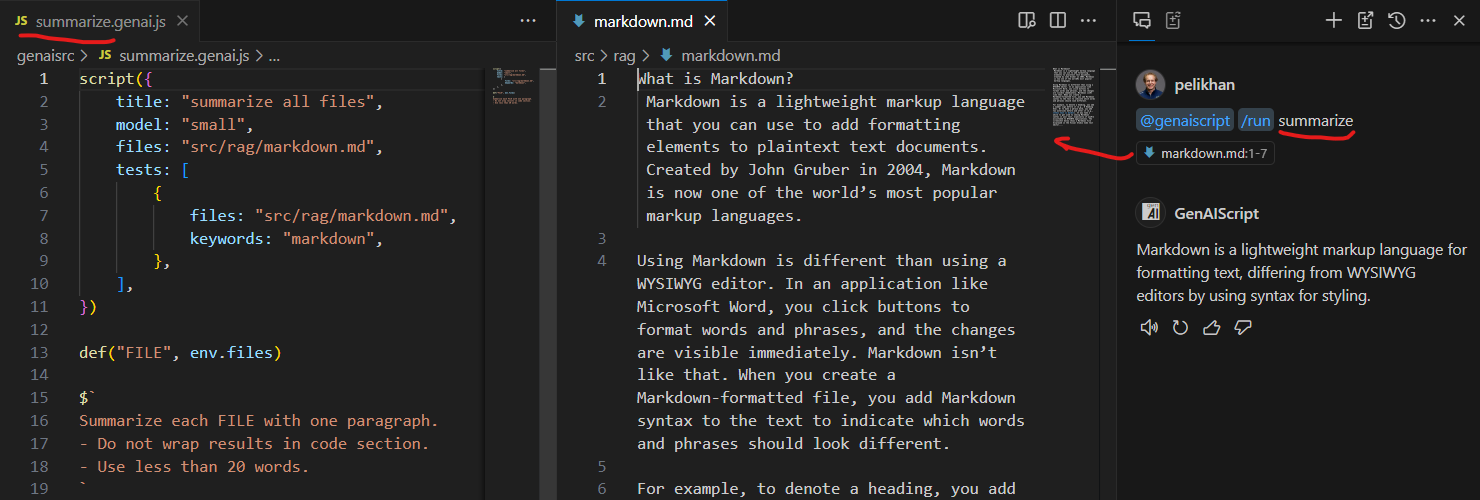
GitHub Copilot Chat
GenAIScript integrates with GitHub Copilot Chat by providing a chat participant that allows you to run scripts in the context of a chat conversation, and a custom prompt to generate GenAIScript more efficiently with Copilot Chat.
@genaiscript chat participant
Section titled “@genaiscript chat participant”The @genaiscript chat participant lets your run scripts without the context
of a GitHub Copilot Chat conversation.
This is useful for leverage existing scripts in an interactive chat session.

Choosing which script to run
Section titled “Choosing which script to run”The /run command expects a script id as the first argument (e.g., /run poem). The rest of the query is
passed to the script as the env.vars.question variable.
@genaiscript /run summarizeIf you omit the /run command, GenAIScript will look for a script named copilotchat. If it finds one, it will run it.
Otherwise, it will ask you to pick a script from the list of available scripts.
@genaiscript add comments to the current editorChoosing the model
Section titled “Choosing the model”If your script does not specify a model, GenAIScript will prompt you to choose a model.
You can specify which model to choose in the script configuration as well using the github_copilot_chat provider.
- current selected model:
github_copilot_chat:current
script({ model: "github_copilot_chat:current",});- gpt-4o-mini:
github_copilot_chat:gpt-4o-mini
script({ model: "github_copilot_chat:gpt-4o-mini",});When GenAIScript prompts you to choose a model, it will store your choices in the workspace settings under the
{ "genaiscript.languageChatModels": { "gpt-4o": "gpt-4o-2024-11-20" }}Model availability
Section titled “Model availability”Not all models listed in the GitHub Copilot Chat user interface are available for 3rd party extensions. When GenAIScript tries to access a model that is not available, it will notify you but it does not have over your model access configuration.
Context
Section titled “Context”The context selected by the user in Copilot Chat is converted to variables and passed to the script:
- the prompt content is passed in
env.vars.question. The script id is removed in the case of/run. - the current editor text is passed in
env.vars["copilot.editor"] - the current editor selection is passed in
env.vars["copilot.selection"] - all other file references are passed in
env.files
Examples
Section titled “Examples”mermaidwill generate a diagram from the user prompt.
def("CODE", env.files);$`Generate a class diagram using mermaid of the code symbols in the CODE.`;websearcherwill search the web for the user prompt and use the file in context in the answer.
const res = await retrieval.webSearch(env.vars.question);def("QUESTION", env.vars.question);def("WEB_SEARCH", res);def("FILE", env.files, { ignoreEmpty: true });$`Answer QUESTION using WEB_SEARCH and FILE.`;dataanalystuses the Python code interpreter tools to resolve a data computation question.
script({ tools: [ "fs_read_file", "python_code_interpreter_copy_files_to_container", "python_code_interpreter_read_file", "python_code_interpreter_run", ],});def( "DATA", env.files.map(({ filename }) => filename).join("\n"),);def("QUESTION", env.vars.question);
$`Run python code to answer the data analyst questionin QUESTION using the data in DATA.Return the python code that was used to compute the answer.`;History
Section titled “History”The history of messages is passed in env.vars["copilot.history"]. It is an array of HistoryMessageUser | HistoryMessageAssistant:
[ { "role": "user", "content": "write a poem" }, { "role": "assistant", "content": "I am an assistant" }]Continued conversation
Section titled “Continued conversation”You can use the @genaiscript chat to weave the execution of a script into an existing conversation
or to continue the conversation with Copilot with the results of the script. The results
of the script are placed back into the chat history and are available to any copilot later on.
@genaiscript /run toolwill run thetoolscript and place the results back into the chat history.analyze the resultswill continue the conversation with the results of the script.
Default script
Section titled “Default script ”The following script can used as a starter template to create the default script when the user does not use the /run command.
script({ title: "Reasoning Agent", description: "A reasoning agent that can answer questions about files, git, github, documentation, web queries, video analysis.", model: "large", system: [ // List of system components and tools available for the script "system", "system.assistant", "system.safety_harmful_content", "system.safety_jailbreak", "system.safety_protected_material", "system.tools", "system.files", "system.files_schema", "system.diagrams", "system.annotations", "system.git_info", "system.github_info", "system.safety_harmful_content", "system.safety_validate_harmful_content", "system.agent_fs", "system.agent_git", "system.agent_github", "system.agent_interpreter", "system.agent_docs", "system.agent_web", "system.agent_video", "system.agent_data", "system.vision_ask_images", "system.think", ], group: "mcp", // Group categorization for the script parameters: { question: { type: "string", description: "the user question", }, "copilot.editor": { type: "string", description: "the content of the opened editor, if any", default: "", }, "copilot.selection": { type: "string", description: "the content of the opened editor, if any", default: "", }, }, flexTokens: 20000, // Flexible token limit for the script});
// Extract the 'question' parameter from the environment variablesconst { question } = env.vars;const editor = env.vars["copilot.editor"];const selection = env.vars["copilot.selection"];const history = env.vars["copilot.history"];
$`## Tasks
- make a plan to answer the QUESTION step by step using the information in the Context section- answer the QUESTION
## Output
- The final output will be inserted into the Visual Studio Code Copilot Chat window.- do NOT include the plan in the output
## Guidance
- use the agent tools to help you- do NOT be lazy, always finish the tasks- do NOT skip any steps`;
// Define a variable QUESTION with the value of 'question'def("QUESTION", question, { lineNumbers: false, detectPromptInjection: "available",});
$`## Context`;
// Define a variable FILE with the file data from the environment variables// The { ignoreEmpty: true, flex: 1 } options specify to ignore empty files and to use flexible token allocationif (history?.length > 0) defData("HISTORY", history, { flex: 1, format: "yaml", sliceTail: 10 });if (env.files.length) def("FILE", env.files, { lineNumbers: false, ignoreEmpty: true, flex: 1, detectPromptInjection: "available", });if (editor) def("EDITOR", editor, { flex: 4, ignoreEmpty: true, detectPromptInjection: "available", });if (selection) def("SELECTION", selection, { flex: 5, ignoreEmpty: true, detectPromptInjection: "available", });Unsupported features
Section titled “Unsupported features”The following features are currently not supported in the chat participant:
- Tools (
#tool) Workspacereference
genaiscript custom instructions
Section titled “genaiscript custom instructions ”GenAIScript will automatically save an instructions.md file in the .genaiscript/instructions folder
when you run a script. This file contains the instructions used to generate the script.
---applyTo: "**/*.genai.*"description: "Instructions for working with GenAIScript files"---
## GenAIScript Code Generation Instructions
GenAIScript is a custom runtime for node.js. It provides a set of unique APIs and support the TypeScript syntax, ESM, await/async.
- GenAIScript documentation: https://microsoft.github.io/genaiscript/llms-full.txt- GenAIScript ambient type definitions: https://microsoft.github.io/genaiscript/genaiscript.d.ts
## Guidance for Code Generation
- you always generate TypeScript code using ESM modules for Node.JS.- you prefer using APIs from GenAIScript `genaiscript.d.ts` rather than node.js. Do NOT use node.js imports.- you keep the code simple, avoid exception handlers or error checking.- you add `TODOs` where you are unsure so that the user can review them- you use the global types in genaiscript.d.ts are already loaded in the global context, no need to import them.- save generated code in the `./genaisrc` folder with `.genai.mts` extensionAugmented chat sessions
Section titled “Augmented chat sessions”This is how you start chat sessions using the genaiscript prompt.
Select the Attach Context 📎icon (
Ctrl+/), then select Instructions…, then select the genaiscript.instructions.md prompt.Include instructions to write a script or answer a question about GenAIScript,
write a script that summarizes a video.
Since the prompt injects the entire documentation of GenAIScript (700+kb at this time of writing), you’ll want to use a model with a large context like Sonnet or Gemini.
Also remember that the entire conversation is sent back on each iteration, so this technique works best as a one-shot detailed request.